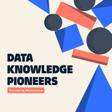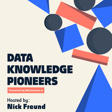
Data Knowledge Pioneers Ep. 2: Taking On Fragmented & Tribal Knowledge
Workstream.io CEO Nick Freund asks: how can data teams capture knowledge and institutionalize it, rather than going down the all-too-commonly-trod road of creating and working within fragmented and tribal knowledge?
He dives into the topic with two brilliant data leaders: Michelle Ballen, Head of Data Analytics at Future, and Scott Breitenother, CEO and Founder of the Brooklyn Data Company.
TRANSCRIPT (abridged):
[00:00:00] Nick Freund: Hey everyone. Welcome back to Data Knowledge Pioneers, presented by Workstream.io and we're again exploring how organizations create shared consciousness around their data. And I'm Nick Freund and we're speaking with leaders and practitioners around the, you know, the acute problems they experience in creating and disseminating knowledge about your data. And so, specifically today we're, we're talking about the issue of fragmented and tribal knowledge. And, and how you can capture that knowledge, institutionalize it and ultimately enable your team. And really excited to introduce two awesome data leaders who always make me think differently about these types of topics.
[00:00:50] So first off, we have Michelle Ballen, who's the head of Data Analytics at Future, which provides one-on-one digital training with fitness coaches. And Scott Breitenother, uh, and I think I butchered his name again.
[00:01:04] Scott Breitenother: Close, close, close enough.
[00:01:06] Nick Freund: Uh, close enough. Uh, who's the founder of Brooklyn Data Company, which is a very large and fast growing data consultancy. Which among other things, gives out these awesome t-shirts. And so if you ever see Scott, uh, you definitely should ask him for one of these. Um, and you probably can get one if you email him at, I think it's just Scott of Brooklyn Data Company. Um, so anyways, Michelle, Scott, thanks so much for joining me today.
[00:01:31] Michelle Ballen-Griffin: Thanks for having us. Yes, that is my go-to gym shirt. Scott, I keep meaning to send you a gym selfie when I'm wearing the Brooklyn DataCo shirt. Um...
[00:01:40] Scott Breitenother: I appreciate it. We, we do t-shirts and data very well. Those are the two things we do. And everything else, it's, it's okay. But t t-shirts and data we do well. I'm glad you, I'm glad you both like it.
[00:01:50] Nick Freund: They're very comfortable. And I will plus one that I work out in this shirt quite a bit. Um, uh, cool. Well, so, uh, nonsequitors aside, I wanted to kind of start by talking about the problem of tribal and fragmented knowledge about your data. So like, what is this? And like, how will we define the problem? So I don't know, Michelle, like, do you have thoughts on how you would define the problem? Like, I have my opinion. But, uh, as a practitioner I would be really interested to hear how you define it.
[00:02:24] Michelle Ballen-Griffin: Yeah. I mean, there's like cross-functional work streams in different pockets of every organization. They have different initiatives that they're testing out. They're learning all the time. And how do you make sure that the knowledge that they're gaining via the initiatives they are testing, the hypotheses that they're validating, actually gets disseminated and shared throughout the organization. Because something that the team might learn on a marketing initiative, maybe it was like a campaign creative, oh, this really resonated with clients from an acquisition perspective, might be relevant to a member experience team who is kind of like doing ongoing sales, um, and kind of keeping clients engaged and retained. And so how do we make sure that the learnings that are happening over there, are being shared throughout the organization...

